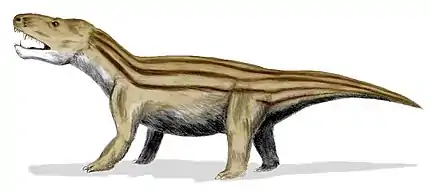| Cynognathus | |||
| Seeley, 1895[1] | |||
| Okres istnienia: 210 mln lat temu | |||
 | |||
| Systematyka | |||
| Domena | |||
|---|---|---|---|
| Królestwo | |||
| Typ | |||
| Podtyp | |||
| Gromada | |||
| Rząd | |||
| Podrząd | |||
| Rodzina | |||
| Rodzaj |
Cynognathus | ||
| Typ nomenklatoryczny | |||
|
Cynognathus crateronotus Seeley, 1895 | |||
| Synonimy | |||
| |||
| Gatunki | |||
| |||
Cynognathus – rodzaj synapsyda z rodziny Cynognathidae w obrębie rzędu terapsydów (Therapsida). Żył w okresie triasu (210 mln lat temu) na obszarze Gondwany. Prawdopodobnie posiadał sierść. Długość ciała 1,5 m; masa ok. 50 kg. Drapieżny, zęby zróżnicowane na siekacze, kły i trzonowe (podobnie jak u ssaków). Posiadał także wtórne podniebienie kostne w czaszce, dzięki czemu mógł pobierać pokarm i żuć bez przerywania oddychania (niezbędny warunek uzyskania stałocieplności).
Etymologia nazwy rodzajowej: gr. κυων kuōn, κυνος kunos„pies”[8]; γναθος gnathos „żuchwa”[9].
Układ kości szczęk i ucha nie pozwala go jeszcze zaliczyć do ssaków, ale jest to klasyfikacja na granicy kryteriów. Przypuszcza się, że mógł on być przodkiem ssaków.

Przypisy
- 1 2 H.G. Seeley. Researches on the structure, organization, and classification of the fossil reptilia.—Part IX., section 5. On the skeleton new cynodontia from the karroo rocks. „Philosophical transactions of the Royal Society of London. B”. 186, s. 59, 1895. (ang.).
- ↑ D.M.S. Watson. A sketch classification of the pre-Jurassic tetrapod vertebrates. „Proceedings of the Zoological Society of London”. 1917 (2), s. 177, 1917. (ang.).
- ↑ F. Nopcsa. Die Familien der Reptilien. „Fortschritte der Geologie und Paläontologie”. 2, s. 122, 1923. (niem.).
- ↑ S.H. Haughton. A bibliographic list of Pre-Stormberg Karroo Reptilia, with a table of horizons. „Transactions of the Royal Society of South Africa”. 12 (1), s. 51–104, 1924. DOI: 10.1080/00359192409519299. (ang.).
- ↑ A.S. Brink. Two cynodonts from the Ntawere Formation in the Luangwa Valley of Northern Rhodesia. „Palaeontologia africana”. 8, s. 94, 1963. (ang.).
- 1 2 R. Broom. On the lower jaw of a small mammal from the Karoo Beds of Ariwal North, South Africa. „The geological magazine, or, Monthly journal of geology”. New series: Decade IV. 10 (8), s. 345, 1903. DOI: 10.1017/S0016756800115146. (ang.).
- 1 2 R. Broom. On some new carnivorous therapsids. „Bulletin of the American Museum of Natural History”. 32 (37), s. 557, 1913. (ang.).
- ↑ Jaeger 1944 ↓, s. 66.
- ↑ Jaeger 1944 ↓, s. 98.
Bibliografia
- Edmund C. Jaeger, Source-book of biological names and terms, wyd. 1, Springfield: Charles C. Thomas, 1944, s. 1-256, OCLC 637083062 (ang.).